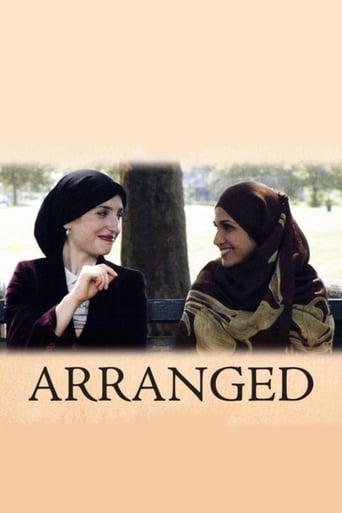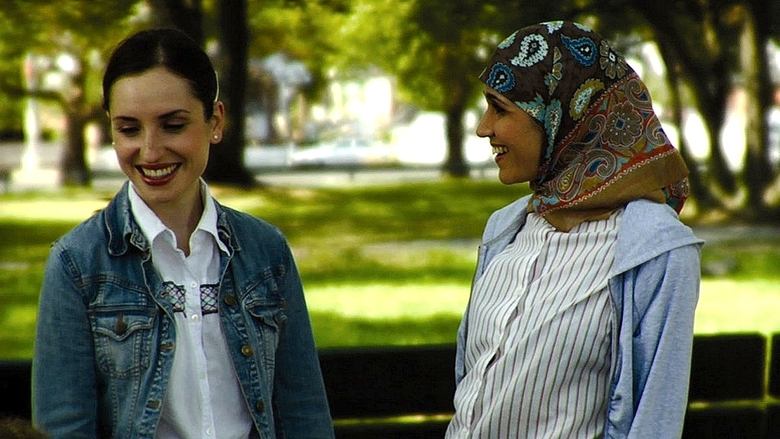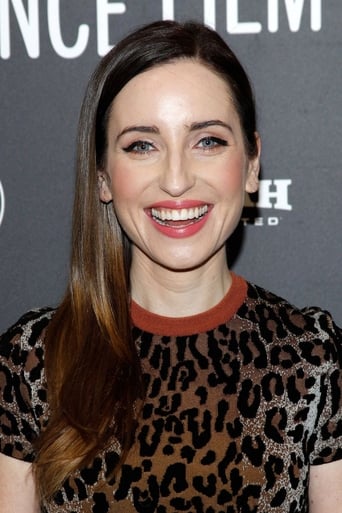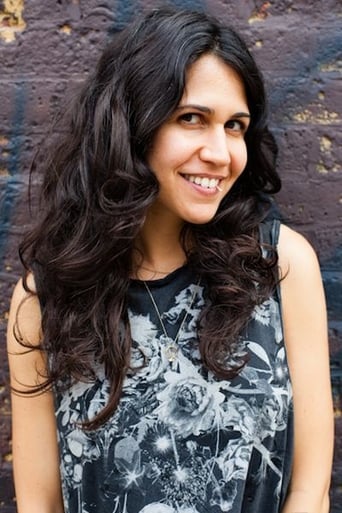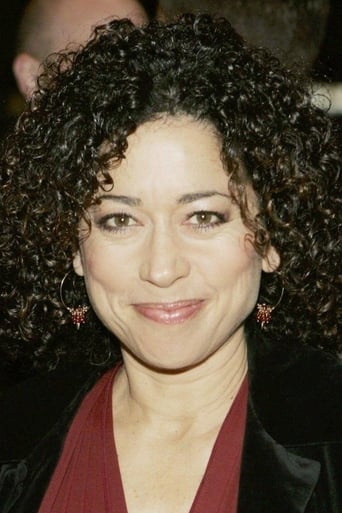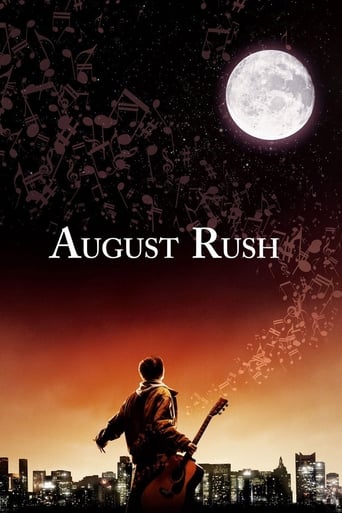Arranged (2007)
ARRANGED centers on the friendship between an Orthodox Jewish woman and a Muslim woman who meet as first-year teachers at a public school in Brooklyn. Over the course of the year they learn they share much in common - not least of which is that they are both going through the process of arranged marriages.
Watch Trailer
Cast
Similar titles
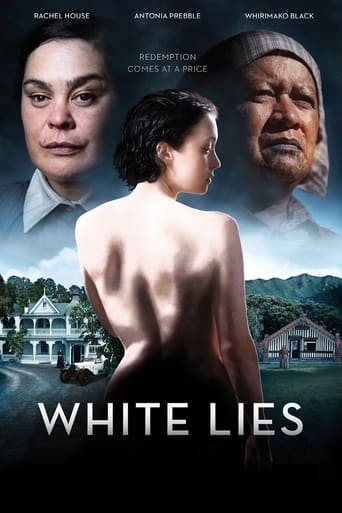
Reviews
Simply Perfect
I don't have all the words right now but this film is a work of art.
A story that's too fascinating to pass by...
This is a small, humorous movie in some ways, but it has a huge heart. What a nice experience.
Arranged (2007) was directed by Diane Crespo and Stefan C. Schaefer. (Schaefer was also the writer.) Zoe Lister Jones plays Rochel Meshenberg, a young Orthodox Jew, and Francis Benhamou play Nasira Khaldi, a young Orthodox Muslim. Both young women are new teachers in the New York City school system.Both of these women accept their culture, in which arranged marriages are the accepted norm. Neither woman rejects the reality of arranged marriages. The problem is that the prospective partners are definitely not to their liking.Living in the U.S. in the 21st Century exposes the women to a society in which an arranged marriage is considered an anomaly. In fact, this is the position taken by the school's well-meaning, but dismally unaware principal. (Played by Marcia Jean Kurtz.) In fact, the intrusions of Principal Jacoby are so clumsy that all she does is alienate both women, and drive them closer together. (I think Crespo and Schaefer brought her into the movie to present what they see as the feminist viewpoint. The feminist viewpoint has a place in the film, but not in the manner in which it's portrayed.)Similarly, Rochel's visit to her non-Orthodox cousin is another clumsily portrayed view of the outside world. Women who leave the Orthodox community don't automatically gravitate to parties where everyone is drugged out.Despite these flaws, the basic plot works well. We can believe that the women would become friends. They accept each other as faithful members of a different culture and religion, and they move on from there. They can remain friends, but only on neutral turf like the school or a park, but that's OK.Both can remain firmly within their communities, but try to find happiness on their own terms. In order to learn how they move forward, you'll have to see the movie.We saw this film on DVD, and it worked very well on the small screen. It was highly recommended by a knowledgeable friend. In turn, I'm recommending it to anyone reading this review. It's definitely worth seeing.
As an orthodox (religious) Israeli Jew - I would like to give my impression of this film which deals with the friendship that evolves between 2 young teachers one a religious Muslim and the other religious (orthodox) Jewish. Firstly despite the political tensions that there are between Jews & Arabs culturally they have more in common with each other then with Christens or the atheistic/non religious western culture – So it does not surprise me the plot of their friendship. I think the film goes along way in tackling the misconception that an arranged marriage means no choice and depicting-especially through the biased principal -the intolerance of the supposedly open minded western world. That said, I feel there is some what of an inaccurate and biased portrayal of Rachel , her family and the religious(orthodox) Jewish world. Firstly some quotes from other reviews that also felt this:"when Nasira firmly refuses his chosen prospect, he offers only minimal resistance - and the father-daughter relationship appears to be strengthened by the episode. It is Rochel who must resist themost serious psychological onslaught from a gaggle of marriage arrangers after they present her with a parade of socially ineptmisfits. When all of them are rejected, Rochel's mother blames herunrealistic expectations for her father's rising blood pressure, andpredicts lifelong spinsterhood, family disgrace and diminishedmarriage prospects for a younger sister - and Rochel subsequentlybegins to consider fleeing her family's community.The scenes that follow all have to do with welcoming strangers into one's home (The Muslim family does, the Jewish one does not), choices in marriage (both girls have a problem with this, but onlythe Jewish woman has a problem with her family as well) or the talkthat binds their friendship.""What bothered me about the movie and something I've not seenmentioned is the political correctness evident throughout. The Jewsare depicted as narrow minded somewhat brutal or stupid haters of allthings either Arab or maybe non-Jew. Meanwhile the Arabs are allmellow high IQ tolerant understanding scholars. Where the Jewsthreaten and brutalize their daughter, the Arabs are understanding oftheirs.Even the home life reflects this. The Arabs are a loving family whilethe Jews snipe at each other, whine, terrify the daughter by sayingher behavior will kill the father and even includes a consistentlynasty little kid." The Muslim family in general is depicted as more open to strangers and in a more positive light. While there may well exist individuals in the religious American Jewish world who fit the picture presented – I feel it is more a stereotyped caricature. While Rachel's mother might have had misgivings about Rachel's Muslim friend coming over she would not have made her leave.(welcoming quests is an important part of both Arab and Jewish culture). The film also made all except the Last of Rachel's shidduch dates out to be total losers and misfits – this would rarely be the case –though it might Take a number of "tries" to find the right one. In the reality of how arranged marriages work in the Jewish world a lot of time would be spent before the actual date checking the "prospect" out by getting character references from at least 3-4 different sources. Also the Shadchanit seemed to always only stress the prospective boy's financial future.In reality more stress is usually placed on the boy's knowledge of Torah(Jewish law)Good character ,level of observance of Jewish law and specific traits one is looking for – quiet or gregarious etc. The object being not to have the couple meet unless there is a Good chance of compatibility. Again while it is a pressured process most families would be more understanding and less pressuring then Rachel's family is portrayed. Also there are many different sub groups of orthodox Jews and depending on the custom of the the sub group the couple would meet from a few times to say up till about 3 months before getting engaged. In reality these marriages are usually more stable and successful then the secular –live together for a couple of years then maybe marry type. Why ? The difference between visiting a place as a tourist or looking for a place to live-one looks for different things and there's a different kind of commitment. Yes as opposed to modern western culture – marriage and family are seen as central to life and not to get married not really an option.In short this film was an interesting attempt at tackling an unusual subject but the inaccurate negative caricatures spoil it.
What a remarkable film. I cannot tell you anything about who made it, why it was made, who financed it, who the main actors were and what they've done before this.I cannot say anything much about the music, the setting, or the technical details that make a great film. None of those details matter.What does matter is that it is an engaging film that speaks of the only way that Jews and Muslims are ever going to solve their difficulties.It must begin with women and not just ordinary women, but women of great incite and tolerance and dare I use the word, love.Both cultures have the word in their religion's vocabulary. The film seems to be saying learn what it means, and how to use it. The film takes for granted that both these women know what friendship means. They are bound not so much by their differences as their similarities.Basically, the plot revolves around two modern women (or at least women who have grown up in a modern world) of vastly different backgrounds. They meet at the school where they will both be teaching. One, a Muslim, has been assigned a regular grade 4 class and the other, a Jew, has been assigned to special Education - her main assignment seems to be a blind boy who understands the workings of the soul almost as well as his teacher. Certainly, he is more practical and a lot more jovial.The grade 4 class brings the problem into direct focus. They have obviously watched too much Fox News. They think that all Jews have horns (according to their Arab Neighbors) and all Arabs are bloodthirsty terrorists (according to the Jewish media). These two women work together on an idea developed by the Special Ed teacher to show that prejudice can be overcome by groups that don't allow hatred and ugly connotative words to develop at inflexibly deep levels.The scenes that follow all have to do with welcoming strangers into one's home (The Muslim family does, the Jewish one does not), choices in marriage (both girls have a problem with this, but only the Jewish woman has a problem with her family as well) or the talk that binds their friendship.I know that life is not that simple, but if we do not find alternatives to the hatred in the planet, then we will live in a hate-infested planet. Someone has to have the courage to write and speak about what can be done, not what is done. We need hopes, not 6:00 news. We need laughter and understanding, not tears and hatred. We need what this film offers.I gave this film a 10 because it offered us choices, and it did so in a way that compromises nothing of our beliefs, and did everything it could to enhance our humanity. It did it with humor, good will, common sense and a little bit of cunning, but just a little.
It's hard to say why this movie is not as bad as it sounds. The story of two teachers , a young Muslim woman and an Orthodox Jewish girl, who become allies against the stereotypes they encounter and who end up best friends, sounds like a Hallmark tale--all sugar and spice and everything nice. And the idea of arranged marriages working out well for both sides is also somewhat of a cliché. However, this movie somehow manages to be heartfelt and it contains some nice moments. The two young actresses are very convincing in their respective roles and the atmosphere in the Jewish family is captured quite accurately...maybe because the writer/director knows that milieu well.It's refreshing to see such a positive depiction of a traditional Muslim family in the climate of so much anti- Muslim propaganda. But they seem too good to be true. And the ending suggests that it is women who really "rule" the world by manipulating their "weak" husbands, a very annoying stance to say the least, and one which does not fit the film as a whole.This is a nice little film which would have done better had it avoided some of the very stereotypes it sets out to dispel.
